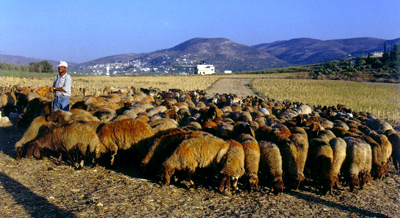23:1 - The Lord is my shepherd, I shall not be in want.
[ T
- OL ]

A Palestinian shepherd and his flock near the Jezreel Valley.
David begins with a confession of faith — "the Lord is my shepherd" — an assertion that spells out his relationship to his God in which God is his shepherd.
The shepherd is one of the most endearing metaphors of God's care in the Bible as, the following examples will prove:1
Then he [Jacob] blessed Joseph and said, "May the God before whom my fathers Abraham and Isaac walked, the God who has been my shepherd all my life to this day, the Angel who has delivered me from all harm—may he bless these boys. (Gen 48:15)
. . . [Joseph's] bow remained steady, his strong arms stayed limber, because of the hand of the Mighty One of Jacob, because of the Shepherd, the Rock of Israel, because of your father's God, who helps you, because of the Almighty, who blesses you with blessings of the heavens above, blessings of the deep that lies below, blessings of the breast and womb. (Gen 49:24-25)
Hear us, O Shepherd of Israel, you who lead Joseph like a flock; you who sit enthroned between the cherubim, shine forth . . . (Psm 80:1)
Hear the word of the Lord, O nations; proclaim it in distant coastlands: "He who scattered Israel will gather them and will watch over his flock like a shepherd."
For this is what the Sovereign Lord says: "I myself will search for my sheep and look after them. As a shepherd looks after his scattered flock when he is with them, so will I look after my sheep. I will rescue them from all the places where they were scattered on a day of clouds and darkness. I will bring them out from the nations and gather them from the countries, and I will bring them into their own land. I will pasture them on the mountains of Israel, in the ravines and in all the settlements in the land. I will tend them in a good pasture, and the mountain heights of Israel will be their grazing land. There they will lie down in good grazing land, and there they will feed in a rich pasture on the mountains of Israel. I myself will tend my sheep and have them lie down," declares the Sovereign Lord (Eze 34:11-15).
I am the good shepherd. The good shepherd lays down his life for the sheep. The hired hand is not the shepherd who owns the sheep. So when he sees the wolf coming, he abandons the sheep and runs away. Then the wolf attacks the flock and scatters it. The man runs away because he is a hired hand and cares nothing for the sheep. I am the good shepherd; I know my sheep and my sheep know me—just as the Father knows me and I know the Father—and I lay down my life for the sheep.
. . . the Lamb at the center of the throne will be their shepherd; he will lead them to springs of living water. And God will wipe away every tear from their eyes. (Rev 7:17)
The idea of Lord being a shepherd is, therefore, not unique. Israel as a nation saw Him as that. What is unique about David's use of the metaphor here is his personalization of the theme; the Lord is not here "our shepherd" but "my shepherd." David is not engaged here in "God talk." This is no religious prattle that does not touch the heart. What he says here flows out of his own personal experience, consciousness, and acknowledgement of the supreme grace of God's care over, and provision for, him. Therefore, he can go on to affirm that "I shall have no want." Can we read — or preach — this psalm with such confident testimony?

Low Chai Hok
©Alberith, 2015